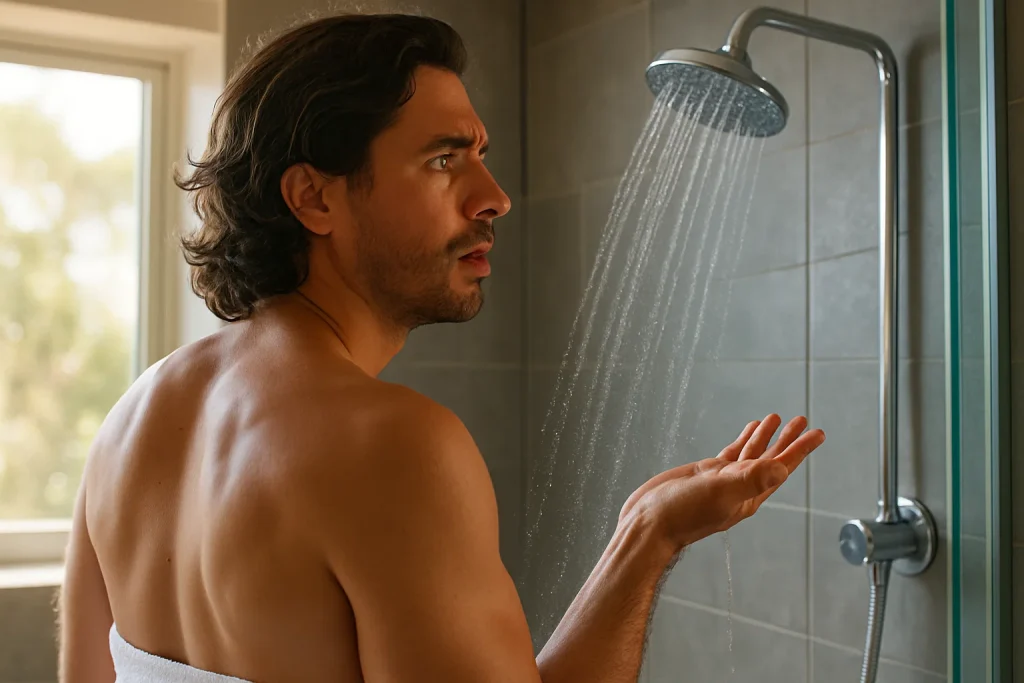Few things are more frustrating than stepping into a shower only to be met with lukewarm or cold water. If you find yourself constantly running out of hot water or waiting too long for it to warm up, your water heater may be the culprit. While minor issues like a tripped breaker or a faulty thermostat can sometimes cause problems, an aging or outdated water heater is often the root cause. Here’s why your system may be struggling and why a professional replacement could be the best long-term solution.

“Why Does My Old Water Heater Struggle to Keep Up?”
Most traditional water heaters are built to last about 8 to 12 years. Tankless systems can last up to 20 years, but still run into problems before that. After this lifespan is up, their efficiency begins to decline. Minerals and sediment build up inside the tank, reducing its capacity to hold and heat water. Heating elements wear out, and insulation breaks down, forcing the unit to work harder just to deliver the same results.
If your water heater is more than a decade old, these inefficiencies can make it difficult—or even impossible—for it to keep up with your household’s demand. Families often notice they’re running out of hot water faster than before, or that recovery time between showers or laundry cycles has stretched longer than ever.
“Why Are My Water Heater Bills So High?”
An outdated water heater doesn’t just underperform—it can also drive up your energy bills. When a heater has to cycle more frequently or run longer to maintain the right temperature, it uses more electricity or gas. Over time, those added costs can become significant. A modern, energy-efficient model not only delivers hot water more reliably but can also reduce monthly utility expenses.
“Why Does My Water Heater Keep Leaking?”
As water heaters age, the likelihood of sudden failure increases. Corrosion inside the tank can weaken the metal, leading to leaks or even a complete tank rupture. This isn’t just an inconvenience; it can cause extensive water damage in your home. Replacing your unit before it fails reduces the risk of unexpected breakdowns and the stress of an emergency situation.
“What Can I Do About Consistent Problems?”
Some homeowners wonder whether a simple repair might fix the issue. While replacing a thermostat, element, or valve can sometimes buy a little time, those repairs are often short-lived on an aging system. A professional plumber can evaluate your water heater, determine its condition, and recommend whether replacement is the more cost-effective choice.
Professional installation ensures your new system is properly sized for your household’s needs, safely connected, and set up for peak efficiency. Today’s water heater options include high-efficiency tank models and tankless systems that provide virtually endless hot water on demand. A professional can walk you through the choices and help you find the best fit for your lifestyle and budget.
Frequently Asked Questions
Question: Why isn’t my hot water getting hot?
Answer: If your water heater isn’t producing enough hot water, it may be due to age, sediment buildup, or failing heating elements. Over time, these issues reduce efficiency, causing longer recovery times or lukewarm water instead of steady hot water.
Question: What role does the age of the water heater play in this issue?
Answer: Most standard water heaters last about 8 to 12 years. As the unit ages, components wear down and internal buildup occurs, reducing efficiency and making it harder to consistently heat water to the proper temperature.
Question: Can mineral buildup affect how hot my water gets?
Answer: Yes. Minerals and sediment collect at the bottom of the tank, insulating the water from the heating elements. This reduces heating capacity, increases energy use, and can eventually cause your water to only get lukewarm.
Question: Is it better to repair my heater or replace it when it’s not heating well?
Answer: If your heater is newer and in good condition, a repair might be worthwhile. But if it’s older, inefficient, or frequently underperforming, replacement is often the more cost-effective and reliable long-term option.
Question: What are some quick checks I can do before calling a professional?
Answer: Start by confirming the thermostat setting, checking for power or pilot light issues, and flushing the tank to remove sediment. If these steps don’t help, contact a qualified technician to inspect for deeper mechanical or electrical problems.
For water heater replacement you can count on, Go With Charleston’s 1st Choice in HVAC and Plumbing. Schedule an appointment with 1st Choice A/C, Heating, Plumbing & Gas, LLC today!
